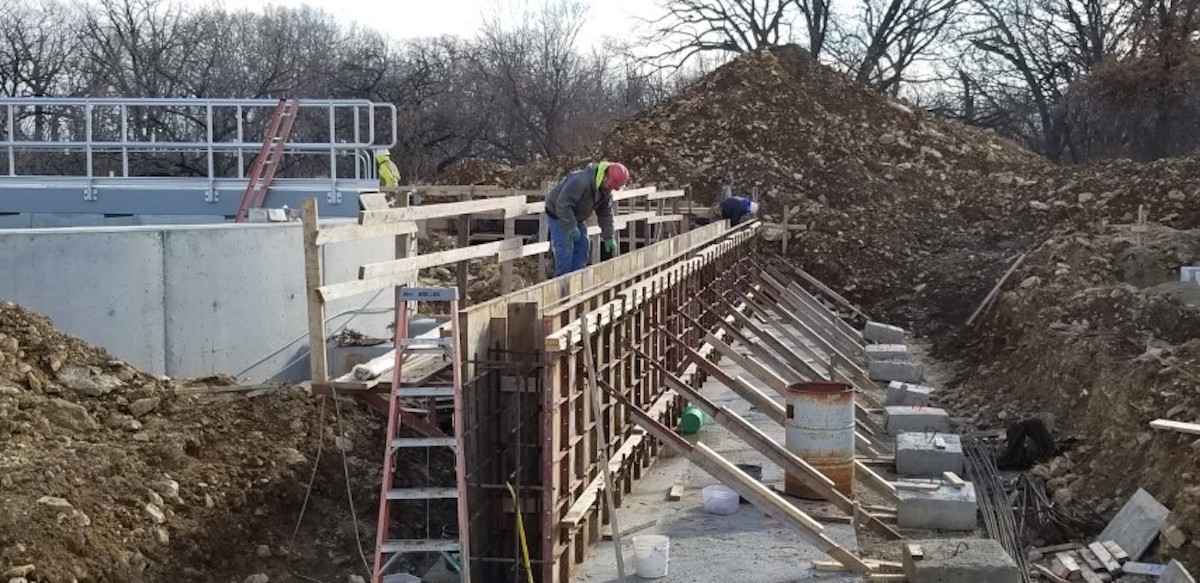What is a typical wastewater treatment plant life expectancy?
Municipal wastewater treatment systems across the U.S. are facing pressure to improve their performance without increasing costs. However, the average wastewater treatment plant life expectancy is 40 to 50 years, and treatment equipment typically lasts 15 to 20 years. As a result, a majority of Publicly Owned Treatment Works (POTWs) established in the early 1970s require improvement, repair or replacement to extend their lifetimes. These modifications are crucial to protect surface waters from nutrient concentrations and to implement effective stormwater management to avoid overflow.
Below, we discuss some of the major factors affecting the lifespan of POTWs and how municipalities can address the challenges of aging wastewater infrastructure.
Factors affecting wastewater treatment plant life expectancy
A wastewater treatment plant reaching the end of its lifecycle contributes to a higher amount of greenhouse gas emissions because older pumps, motors and other equipment use more energy than newer, more efficient components. Aging infrastructure design and equipment result in higher electricity costs that may account for up to 40% of a wastewater treatment plant's operating budget. With changing effluent standards, lower energy efficiency and higher maintenance costs, aging POTWs can become a financial headache and a potential hazard. By emphasizing sustainability and identifying ways to improve energy efficiency, municipalities can make improvements that increase wastewater treatment plant life expectancy while also relieving some of their financial pressure.
Three key factors that reduce the life expectancy of a POTW are:
Growing urban environments.
The infrastructure of some POTWs is already struggling under the population rise in urban and semi-urban areas and the resulting increase in effluent volumes. Centralized wastewater treatment plants (WWTPs) treat around 62.5 billion gallons of wastewater per day. Around 15% of the more than 16,000 WWTPs across the U.S. have reached or exceeded their design capacities, in large part because of the need to accommodate larger wastewater demands from growing populations. Operating above capacity increases wear on treatment plant systems and decreases plant life expectancy.
Lack of innovative treatment technologies.
Most POTWs were designed to meet effluent standards established decades ago. As standards have changed, they struggle to stay compliant, especially because older treatment processes often have higher energy consumption. Plants willing to alter their treatment processes can improve overall performance and increase energy efficiency. Innovative technologies that can help wastewater treatment plants meet new treatment standards and effluent limitation guidelines while also lowering carbon footprint include:
- Flow through fixed film and lagoon-based systems for small communities.
- Primary media filtration.
- Anoxic removal of organics.
- Integrating fixed film and activated sludge.
- Replacement of oxygen supplying equipment (blowers).
- Replacement of variable frequency drives and motors.
- Leveraging methane generated from anaerobic digestion of biosolids as an energy resource.
In addition to extending the plant’s capacity and useful life, these new technologies can increase energy efficiency, which can help offset the financial burden aging infrastructure has on municipalities and ratepayers.
Aging or mismatched equipment.
The typical lifespan of wastewater pipes is 50 to 100 years. Wear and tear on collection systems can let groundwater and stormwater enter the networks through cracks and joints. Once groundwater or stormwater finds a way in, these problems get progressively worse. Overtaxed wastewater collection systems result in sanitary sewer overflows (SSOs). Further, if pumps, flow control and motors do not match treatment plant needs, the mismatch can lead to higher energy costs and overworked equipment that burns out faster.
As wastewater treatment systems are deteriorating, several municipalities are opting for an asset management approach that focuses on the cost-effective sustained performance of wastewater collection and treatment system assets throughout their lifecycle. This involves regular inspection of the system and preventive maintenance to reduce instances of breakdown and extend equipment life. For municipalities, an effective asset management approach can work best when implemented along with the options to retrofit or upgrade treatment plants.
Extending wastewater treatment plant life expectancy through retrofits or upgrades
Wastewater treatment plant designs become obsolete with changing effluent regulations and treatment standards. Retrofitting a grit-removal system, manual bar screen, mechanically cleaned screen or headworks facility can significantly improve the performance of downstream equipment and the overall efficiency of the system. Upgrading a wastewater treatment plant requires more detailed planning to analyze various treatment processes and select the most cost-effective solution. Municipalities often lack the knowledge to make the right decision and need the expertise of wastewater engineers.
The team of licensed engineers and wastewater operators at Fehr Graham can help municipalities assess the life expectancy of wastewater treatment plants and develop environmentally compliant and cost-effective solutions to improve treatment processes. Our end-to-end assistance through the pre-application phase to the design and construction phases have helped treatment plants serve their communities for many more years.
To learn more about how Fehr Graham can help improve wastewater treatment plant life expectancy, contact us or give us a call at 217.352.7688
Collaborative, Insightful, Results-Driven Solutions
Fehr Graham provides innovative engineering and environmental solutions to help improve the lives and communities of our customers.


